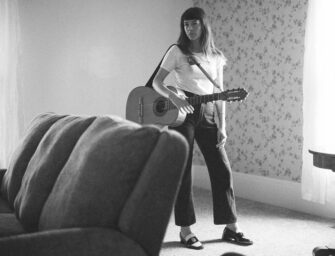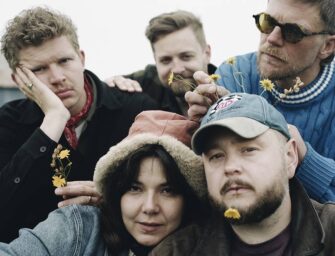
The Kooks’ Luke Pritchard on Naïve: “It was the last song I thought would be the one that would make everything happen.”
Take a dose of relationship anxiety, add a sprinkling of jazz chords and danceability, and you have a band-making hit
The Kooks emerged in the mid-2000s at a time when rough and ready guitar music was very much the order of the day in the UK. Though lumped in with bands like The Libertines, in many ways they were something of a melodic outlier. The success of their 5x Platinum debut from 2006, Inside In/Inside Out, was aided by an army of memorable singles. You Don’t Love Me, She Moves In Her Own Way, and Ooh La all had an appeal that extended far beyond the sweaty live bars. This was music for Myspace, the radio and beyond.
Of all the songs taken from the album, fourth single Naïve remains an enduring reminder of their crossover appeal. Their first song to make the Top 5 in the UK Singles chart, it was the country’s 19th biggest-selling single of 2006. A streaming favourite, it has now clocked up over half a billion streams on Spotify. Here, frontman and chief Kooks songwriter Luke Pritchard tells us about the creation of one of his band’s most iconic songs.
Article first appeared in Songwriting Magazine Summer 2023 issue

Released: 27 March 2006
Artist: The Kooks
Label: Virgin
Songwriters: Paul Garred, Hugh Harris, Luke Pritchard, Max Rafferty
Producers: Tony Hoffer
UK Chart Position: 5
US Chart Position: –
“I lived in a little triangle house in Clapham. It was just me and my mum in a really bizarre little house. I used to live at the top, in the loft which was unfinished for a year. Because I was right up in the loft, I could play there fairly loudly. So I would write a lot in the middle of the night on my nylon string acoustic.
“I wrote Naïve quite early on. I was very young and it was before I met the band. I used to have this system where I’d write late at night. I smoked a lot of weed at that time, I can’t do it any more, but I would get in that state and then I would write some stuff. Then in the morning, if I could remember that song, I would be like, ‘That’s a good song.’ The way I wrote was quite simple and it would just be verse and chorus. Then I’d park it up, and if I remembered it, great. And Naïve was one I remembered.
“I was really into vulnerability in songwriting. You can write songs where you’re trying to be cool, whatever, but I remember that one was the least guarded song I’d ever written. I was almost embarrassed to say the lyrics. Six months later when I started the band with Hugh [Harris], it was one of the songs I was a little bit nervous or embarrassed to show, especially with the fear and paranoia I was feeling when I wrote the song. So I found it quite cool that it was one people really loved. I wasn’t even sure it would work with all the other songs in the band, because it was so different.
“It’s a song about what I was going through. I had a girlfriend who was becoming quite famous, and she was going into this whole world that I couldn’t be part of and was quite cynical of. It was quite a bizarre song to write when you’re that age. It’s vulnerable. With the guys, I think they had to force me to want to record it for the album. I wasn’t always so keen as I didn’t see that it would connect with people on such a big level.
“At the time I was trying all these fancy jazz chords. I am not the most technical guitar player, but I was trying to create weird chords and weird chord patterns. I had the choppy kind of funky rhythm. I had that and I had the verse and the chorus. With a lot of my songs, I would just have a verse and the chorus. Everyone would be like, ‘You need to write another verse.’ I’m like, ‘Why? I’m lazy.’ So it was pretty much unchanged. I think Tony Hoffer asked me to write a second verse so many times, that in the end, I was like, ‘Fuck it. I’m gonna write half a third verse.’ But I was like, ‘The verse is perfect. You can’t change the verse.’
“There’s something weird with songwriting where, in the inception of a song, if you write something and then you go back to it and try and rewrite on it, it’s very painful, very difficult. It can be done, but you will never get back to how you felt when you sang those words when you first wrote them. I’ve learned that now – you’ve got to really see it through when you’re writing a song, particularly the lyrics, otherwise it can be quite different.
“I was listening to The Smiths a lot back then. I loved the idea of writing these really sad words over dance music. That was a big thing I took from The Smiths. I had discovered The Smiths; I didn’t grow up with them. With Naïve, what the band brought to it was the danceability, because we wanted people to dance. That was a big thing in the band, we wanted to get people dancing. What I had was a kind of Jack Johnson campfire song with jazz chords and they brought some serious upbeat danceability. I could pinpoint exactly The Smiths on that, for inspiring those two worlds.
“I’m not into the literal. I think the language of music is to be projected onto. You want a song to mean 1,000 things. I don’t know how intentional that is, but I think that’s always how I’ve written music. The song is a feeling that someone has, that hollow feeling of not knowing and suspicion and paranoia. You don’t have to be explicit with those kinds of emotions. I’ve been in the back of a black cab and the driver’s gone, ‘Oh, are you in The Kooks? That Naïve. I was breaking up with my wife…’ It’s cool. It’s amazing to have people feel that they can relate to you.

The Kooks’ Luke Pritchard: “I think the language of music is to be projected onto. You want a song to mean 1,000 things.”
“I have to credit Hugh for getting me around and Nick Burgess, the A&R. From day one he saw the potential in the song, he loved it. I wouldn’t say we had fights on it but I was just confused. I was like, ‘It’s cool but should it even be on the album?’ It was different to the rest. Hugh was like, ‘You’re a fucking idiot, it’s great. People love it. Don’t fight it.’ It was the last song I thought would be the one that would make everything happen. There was some arm-twisting and it was a very hard song to record as well.
“All the other songs on the album were pretty straightforward and really fun. With Naïve we recorded it with various producers. Tony Hoffer did it in the end, but we tried it in so many ways. It was also the only track we did to a click track on the album. We hated click track. I love our first album for that. A lot of the tempos are all over the place. I love making records like that, it’s really fun and it’s exciting. But Naïve, I remember we didn’t enjoy it. I can enjoy a click track now, but then I was fucking hating it.
“It was quite hard to get the groove. It’s such a sparse groove between the bass and drums, and the funk. Naïve could almost fall apart at any time. It’s one guitar over here doing one thing, and then the bass barely playing, except for the chorus, and then the drums doing this funky rhythm. It’s a lot of cross-rhythms. When you’ve played it a lot, it’s cool, but, when we were trying to record it, tempos would get out of control. We were recording to tape as well, so we had to do the whole song. We weren’t using ProTools, editing stuff. It meant we had to get the whole thing and it was quite challenging, even though it’s so simple.
“I feel very proud of it. I don’t think I would have said that a few years ago. As human beings, we want to be going forward all the time, and you want to be like, ‘I’m gonna get better.’ For a while, I found it a bit of an albatross. Any artist or band would be lucky to have one song like that, but there are times when that can feel a little suffocating because you’re like, ‘Well, I’ve got so much more than that.’ We’re not a one-hit wonder, so it’s not about that. But that song has followed me around. But now, I mean, it’s pretty cool. I’ve noticed that it’s brought us into other genres like hip-hop and R&B. It appeals to different styles of music and that’s brought us into some different worlds, which I’m very grateful to the song for doing.”




































Related Articles